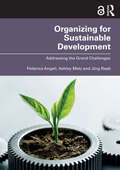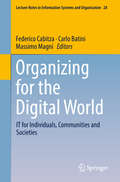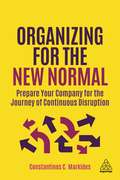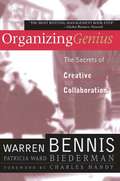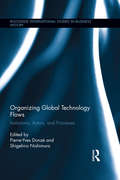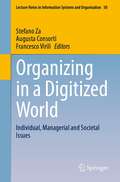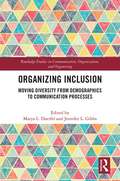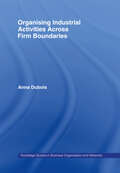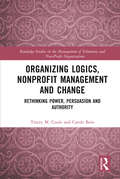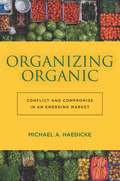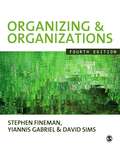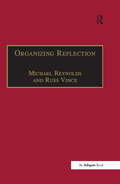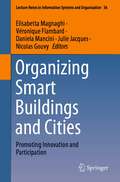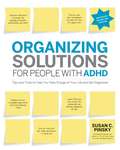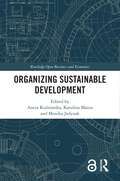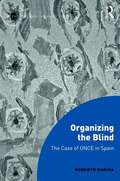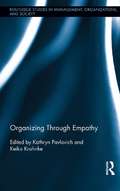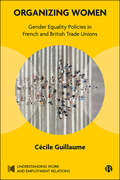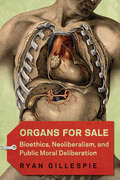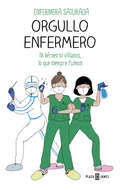- Table View
- List View
Organizing for Sustainable Development: Addressing the Grand Challenges
by Federica Angeli Ashley Metz Jörg RaabThe Sustainable Development Goals (SDGs) recognize the increasingly complex, interdependent nature of societal and environmental issues for governments and business. Tackling such "grand challenges" requires the concerted action of a multitude of organizations and multiple stakeholders at different levels in the public, private, and non-profit sector.Organizing for Sustainable Development provides an integrated and comparative overview of the successes and failures of organizational efforts to tackle global societal issues and achieve sustainable development. Summarizing years of study by an interdisciplinary board of authors and contributors, this book provides readers with an in-depth understanding of how existing businesses and new hybrid organizations can achieve sustainable development to bring about an improved society, marking a key contribution to the literature in this field.Combining theoretical views with empirical approaches, the chapters in this book are highly relevant to graduate and undergraduate (multidisciplinary) programs in sustainable development, organization studies, development economics, development studies, international management, and social entrepreneurship.The Open Access version of this book, available at www.taylorfrancis.com, has been made available under a Creative Commons Attribution-NonCommercial (CC-BY) 4.0 license.
Organizing for the Digital World: It For Individuals, Communities And Societies (Lecture Notes in Information Systems and Organisation #28)
by Federico Cabitza Carlo Batini Massimo MagniThis book argues that “organizing” is a broader term than managing, as it entails understanding how people and machines interact with each other; how resources, data, goods are exchanged in complex and intertwined value chains; and how lines of action and activities can be articulated using flexible protocols and often ad-hoc processes in situated practices of use and production. The book presents a collection of research papers shedding new light on these phenomena and related practices from both academic and professional perspectives. Given the plurality of views that it offers, the book makes a relevant contribution to the understanding and appreciation of the complexity of the digital world at various levels of granularity. It focuses on how individuals, communities and the coopetitive societies of our new, global and hyperconnected world produce value and pursue their objectives and ideals in mutually dependent ways. The content of the book is based on a selection of the best papers - original double-blind peer-reviewed contributions - presented at the annual conference of the Italian chapter of the AIS, which was held in Milan, Italy in October 2017.
Organizing for the New Normal: Prepare Your Company for the Journey of Continuous Disruption
by Constantinos C. MarkidesWe live in a world of continuous disruption. Before we have a chance to respond to one disruption, another hits. Before we finish one transformation journey, we need to embark on another. How do you prepare the organization for this new normal of continuous disruption? This is the challenge that every organization is now facing, no matter how successful their digital transformation of the past decade has been.Organizing for the New Normal explores how to prepare the organization for this unique challenge. How do you develop a strategy for what is coming next while you are busily driving your current transformation? And how do you convince emotionally exhausted employees to join you on the journey? The book does not provide a ready-made recipe for success, but rather explores how to put together the ingredients that will improve the odds of success. Organizing for the New Normal outlines the leadership competencies critical for success in the "new normal", such as:· How to create a "permanent" sense of urgency and an organization-wide unease with the status quo· How to convince people to exploit disruption as an opportunity when all they see around them are the negative consequences of disruption· How to institutionalize into the DNA of the organization the day to day behaviors that would allow us to identify and respond to change early-and how to achieve this in a decentralized way· How to develop a strategic response that is innovative and aims to attack the disruption rather than defend against it.
Organizing Genius: The Secrets of Creative Collaboration
by Warren Bennis Patricia Ward BiedermanUncovers the elements of creative collaboration by examining six of the century's most extraordinary groups and distill their successful practices into lessons that virtually any organization can learn and commit to in order to transform its own management into a collaborative and successful group of leaders. Paper. DLC: Organizational effectiveness - Case studies.
Organizing Global Technology Flows: Institutions, Actors, and Processes (Routledge International Studies in Business History)
by Pierre-Yves Donzé Shigehiro NishimuraResearch on the international transfer of technology in economics and management literature has primarily focused on the role of countries and that of companies, in particular multinational enterprises (MNEs). Similarly, economic and business historians have tended to view international technology transfer as a way for economically ‘backward’ countries to acquire new technologies in order to catch up with more developed economies. This volume provides a more in-depth understanding of how the international transfer of technologies is organized and, in particular, challenges the core-periphery model that is still dominant in the extant literature. By looking beyond national systems of innovation, and statistics on foreign trade, patent registration and foreign direct investment, the book sheds more light on the variety of actors involved in the transfer process (including engineers, entrepreneurs, governments, public bodies, firms, etc.) and on how they make use of a broad set of national and international institutions facilitating technology transfer. Put differently, the volume offers a better understanding of the complexity of global technology flows by examining the role and actions of the different actors involved. By bringing together a number of original case studies covering many different countries over the period from the late 19th to the 21st century, the book demonstrates how technology is being transferred through complex processes, involving a variety of actors from several countries using the national and international institutional frameworks.
Organizing in a Digitized World: Individual, Managerial and Societal Issues (Lecture Notes in Information Systems and Organisation #50)
by Stefano Za Augusta Consorti Francesco ViriliIn a digitized world, organizations and individuals have to deal with several challenges. Both public and private organizations must revise their processes and create new ones to take advantage of new opportunities and respond to emerging threats. At the same time, people need to redesign their personal and professional lives to create situations or conditions conducive to achieving their goals in an ever-expanding digital environment. This book contains a collection of research contributions that address the issues that individuals, organizations, and society face when operating in a digitized world. The plurality of views offered makes this book particularly relevant to academics, businesses, and public sector organizations. It gathers a selection of the best papers (double-blind peer-reviewed) presented at the Annual Conference of the Italian Section of AIS in October 2020 in Pescara, Italy
Organizing Inclusion: Moving Diversity from Demographics to Communication Processes (Routledge Studies in Communication, Organization, and Organizing)
by Marya L. Doerfel Jennifer L. GibbsOrganizing Inclusion brings communication experts together to examine issues of inclusion and exclusion, which have emerged as a major challenge as both society and the workforce become more diverse. Connecting communication theories to diversity and inclusion, and clarifying that inclusion is about the communication processes of organizations, institutions, and communities, the book explores how communication as an organizing phenomenon underlies systemic and institutionalized biases and generates practices that privilege certain groups while excluding or marginalizing others. Bringing a global perspective that transcends particular problems faced by Western cultures, the contributors address issues across sub-disciplines of communication studies, ranging from social and environmental activism to problems of race, gender, sexual orientation, age and ability. With these various perspectives, the chapters go beyond demographic diversity by addressing interaction and structural processes that can be used to promote inclusion. Using these multiple theoretical frameworks, Organizing Inclusion is an intellectual resource for improving theoretical understanding and practical applications that come with ever more diverse people working, coordinating, and engaging one another. The book will be of great relevance to organizational stakeholders, human resource personnel and policy makers, as well as to scholars and students working in the fields of communication, management, and organization studies.
Organizing Industrial Activities Across Firm Boundaries (Routledge Studies in Business Organizations and Networks)
by Anna DuboisThe way in which industrial activities are organised among firms is a fundamental theoretical concern. In practice, firms have found these matters, referred to as make-or-buy issues, difficult to analyse. Organising Industrial Activities Across Firm Boundaries succeeds in combining an analysis of the theoretical background to such issues with an in-depth case study of the practical consequences and implications. The book is an important contribution to the literature on networks, business relationships, out-sourcing and the division of labour.
Organizing Logics, Nonprofit Management and Change: Rethinking Power, Persuasion and Authority (Routledge Studies in the Management of Voluntary and Non-Profit Organizations)
by Tracey M. Coule Carole BainNonprofit organizations are conventionally positioned as generators of social and cultural forms of capital for the common good. As such they occupy a different space to other types of organizations such as corporate firms that exist primarily to generate economic capital for private owners/shareholders. Recent years, however, have seen professionalization promoted widely by funders, policy-makers and nonprofit practitioners across the globe. At the same time, there has been an increasing cross-over of employees from private and public bodies into nonprofits. But do such shifts open up space for the wholesale importation of managerialism into and commercialization of the nonprofit sphere? Are nonprofits at risk of being reconstituted as primarily economic entities, serving the interests of a leadership elite? How are such changes in an organization’s trajectory brought about? What are the consequences for trustees, staff, members and the nature of managerial work? The authors engage with critical questions such as these through a unique insider account of one professional institute experiencing unprecedented changes that challenge its very reason for being. Drawing on a three-year ethnography, they narrate organizational inhabitants’ struggles in their search for purpose and analyze the myriad of changes within different aspects of organizing including structure, strategizing, pay and reward, governance and leadership. The book will enable readers to reframe and rethink organizational change as a process involving power, persuasion and authority, and will be of value to researchers, students, academics and practitioners interested in managerial work and organizational change in non-profit organizations.
Organizing Organic: Conflict and Compromise in an Emerging Market
by Michael HaedickeStakeholders in the organic food movement agree that it has the potential to transform our food system, and yet there is little consensus about what this transformation should look like. Tracing the history of the organic food sector, Michael A. Haedicke charts the development of two narratives that do more than simply polarize the organic debate, they give way to competing institutional logics. On the one hand, social activists contend that organics can break up the concentration of power that rests in the hands of a big, traditional agribusiness. Alternatively, professionals who are steeped in the culture of business emphasize the potential for market growth, for fostering better behemoths. Independent food store owners are then left to reconcile these ideas as they construct their professional identities and hone their business strategies. Drawing on extensive interviews and unique archival sources, Haedicke looks at how these groups make sense of their everyday work. He pays particular attention to instances in which individuals overcome the conflicting narratives of industry transformation and market expansion by creating new cultural concepts and organizational forms. At once an account of the sector's development and an analysis of individual choices within it, Organizing Organic provides a nuanced account of the way the organic movement continues to negotiate ethical values and economic productivity.
Organizing & Organizations: An Introduction
by Stephen FinemanOrganizing and Organizations is well loved by students and lecturers for its accessible, conversational tone and insightful real-life examples introducing the study of organizations and organizational behaviour. Fineman, Gabriel and Sims, eminent academics in the field, cover a wealth of key concepts, research and literature leaving students informed and engaged. The Fourth Edition builds on the strengths of previous editions, to provide you with a textbook that continues to stand out from the rest. This new edition has been fully developed to include: - New chapters on Influence and Power, and Innovation and Change. - A new section within each chapter that highlights the theoretical links informing the chapters. - New review questions to test and apply your understanding of the ideas in each chapter. - New 'reading on' sections that direct you to free links to highly recommended journal articles relating to each chapter's coverage, and found on the companion website. - New critical review questions at the end of each chapter to encourage debate. - Each chapter is now enlivened with pictorial illustrations. - A fully updated glossary of key concepts in the study of organizations Organizing and Organizations integrates a strong critical approach throughout.
Organizing Reflection
by Michael ReynoldsThrough a series of leading-edge contributions from pre-eminent international scholars in the field, Organizing Reflection makes a stimulating and distinctive contribution to the study of reflection. By doing so, it offers the first shift from the individual reflective practitioner to processes of collective and public reflection. The unique and varied contributions focus on the development of notions such as public reflection, collective reflection, and critical reflection. In doing so, they provide critical insights into new thinking and approaches to the role of reflection in organizations, as well as the conceptualization and delivery of learning and change. Organizing Reflection will be of interest to scholars working in business, professional, management and organization studies, to human development academics, and to scholarly practitioners in organizations.
Organizing Smart Buildings and Cities: Promoting Innovation and Participation (Lecture Notes in Information Systems and Organisation #36)
by Daniela Mancini Elisabetta Magnaghi Véronique Flambard Julie Jacques Nicolas GouvyThe United Nations included sustainable cities and communities in its 2030 SDGs. Cities and, on a smaller scale, neighborhoods, building managers and firms are now adopting technologies and information systems to help achieve the energy, economic, social and environmental transition. This volume gathers contributions on the key organizational success factors for this transition.To do so, it analyzes the role of information systems, use of data, and technological assistance solutions from multiple perspectives. The goal is to develop a framework that can successfully apply information systems to organizational and environmental issues for smart cities and smart buildings. Accordingly, the book addresses living-lab experiment evaluation techniques, and provides critical analyses of the role of the environment, context and users’ behavioral responses. In addition, it discusses key questions on the efficient management of resources, need for appropriate IT solutions, and employing co-creation with users to improve planning and organization.
Organizing Solutions for People with ADHD: Tips and Tools to Help You Take Charge of Your Life and Get Organized
by Susan C. Pinsky<P>ADD (Attention-Deficit Disorder) and ADHD (Attention-Deficit Hyperactivity Disorder) are prevalent in society, afflicting about 4.4% of the adult population. <P>This book outlines organizing strategies that are of value to those who want to improve their organizational (or lack of) skills in their life.
Organizing Sustainable Development (Routledge Open Business and Economics)
by Aneta Kuźniarska Karolina Mania Monika JedynakThe role and meaning of sustainable development have been recognized in the scientific literature for decades. However, there has recently been a dynamic increase in interest in the subject, which results in numerous, in-depth scientific research and publications with an interdisciplinary dimension. This edited volume is a compendium of theoretical knowledge on sustainable development. The context analysed in the publication includes a multi-level and multi-aspect analysis starting from the historical and legal conditions, through elements of the macro level and the micro level, inside the organization. Organizing Sustainable Development offers a systematic and comprehensive theoretical analysis of sustainable development supplemented with practical examples, which will allow obtaining comprehensive knowledge about the meaning and its multi-context application in practice. It shows the latest state of knowledge on the topic and will be of interest to students at an advanced level, academics and reflective practitioners in the fields of sustainable development, management studies, organizational studies and corporate social responsibility.
Organizing the Blind: The Case of ONCE in Spain (Interdisciplinary Disability Studies)
by Roberto GarvíaThis book is a case study which narrates the history of the National Organization of the Spanish Blind (ONCE), established in 1937 during the Spanish Civil War. Contrary to other affluent countries where most blind people live on welfare benefits, the Spanish blind enjoy full employment. Furthermore, the average income of the Spanish blind is higher than that of the sighted. Why is this so? Why the blind, and not the deaf mute, or any other group of disabled people? This book shows that ONCE answers these questions.
Organizing the Dutch Energy Transition (Routledge Studies in Energy Transitions)
by Hans Van Kranenburg Sjors WitjesThis book addresses learnings from the energy transition in the Netherlands.This book brings together contributions from experts in academia and practice to the Dutch energy transition by sharing their knowledge and experience gained over many years and from different roles and responsibilities. The chapters are clustered around four key perspectives – Policy, Sector, Organization, and Future – and explore the impact of policy decisions of governments and strategic decisions of firms operating in the energy sector on the energy transition process. The different perspectives present many promising strategies, policies, and innovations on each aspect, resulting in a deeper understanding of how each of these strategies, policies, and innovations may hinder or contribute to foster the energy transition. It concludes with a reflection on lessons learned and specific managerial and policy recommendations.This volume will be of great interest to students, scholars, and industry professionals researching and working in the areas of energy transitions, sustainable business, energy technology, and energy policy.
Organizing the Enterprise: Which Form Is Best for You?
by Richard LueckeOne key issue every entrepreneur must address when starting a new business is the legal form the enterprise will adopt. This chapter covers the various legal forms of organization available to U.S. businesses, the advantages and disadvantages of each, and determining which form is best for you.
Organizing through Empathy (Routledge Studies in Management, Organizations and Society)
by Kathryn Pavlovich Keiko KrahnkeEmpathy dissolves the boundaries between self and others, and feelings of altruism towards others are activated. This process results in more compassionate and caring contexts, as well as helping others in times of suffering. This book provides evidence from neuroscience and quantum physics that it is empathy that connects humanity, and that this awareness can create a more just society. It extends interest in values-based management, exploring the intellectual, physical, ecological, spiritual and aesthetic well-being of organizations and society rather than the more common management principles of maximising profit and efficiency. This book challenges the existing paradigm of capitalism by providing scientific evidence and empirical data that empathy is the most important organizing mechanism. The book is unique in that it provides a comprehensive review of the transformational qualities of empathy in personal, organizational and local contexts. Integrating an understanding based upon scientific studies of why the fields of positive psychology and organizational scholarship are important, it examines the evidence from neuroscience and presents leading-edge studies from quantum physics with implications for the organizational field. Together the chapters in this book attempt to demonstrate how empathy helps in the reduction of human suffering and the creation of a more just society.
Organizing to Innovate: Building Your Innovation Capability
by Joseph V. Sinfield Scott D. Anthony Mark W. Johnson Afarin Bellisario Steven C. Wheelwright Elizabeth J. AltmanSuccess requires going beyond winning once to developing deep capabilities that allow a company repeatedly to disarm disruptive threats and seize new opportunities. This chapter describes how companies can build innovation structures that help them address specific innovation challenges and surround those structures with the appropriate systems and culture.
Organizing Women: Gender Equality Policies in French and British Trade Unions (Understanding Work and Employment Relations)
by Cécile GuillaumeThis book explores the representation of women and their interests in the world of work across four trade unions in France and the UK. Drawing on case studies of the careers of 100 activists and a longitudinal study of the trade unions' struggle for equal pay in the UK, it unveils the social, organizational, and political conditions that contribute to the reproduction of gender inequalities or, on the contrary, allow the promotion of equality. Guillaume’s nuanced evaluation is a call to redefine the role of trade unions in the delivering of gender equality, contributing to broader debates on the effectiveness of equality policies and the enforcement of equality legislation.
Organs for Sale: Bioethics, Neoliberalism, and Public Moral Deliberation
by Ryan GillespieOrgans for Sale is a study of the bioethical question of how to increase human organ supply. But it is also an inquiry into public moral deliberation and the relationship between economic worth and the value systems of a society. Looking closely at human organ procurement debates, the author offers a critique of neoliberalism in bioethics and asks what kind of society we truly want. While society has shown concern over debates surrounding organ procurement, a better understanding of the rhetoric of advocates and philosophical underpinnings of the debate might indeed improve our public moral deliberation in general and organ policy more specifically. Examining public arguments, this book uses a range of source material, from medical journals to congressional hearings to newspaper op-eds, to provide the most up-to-date and thorough analysis of the topic. Organs for Sale posits that deciding together on the limits of markets, and on what is and ought to be for sale, sheds light on the moral fibre of our society and what it needs to thrive.
ORGB
by Debra L. NelsonLearn Organizational Behavior YOUR Way with ORGB! ORGB's easy-reference, paperback textbook presents course content through visually engaging chapters as well as Chapter Review Cards that consolidate the best review material into a ready-made study tool. With the textbook or on its own, ORGB Online allows easy exploration of ORGB anywhere, anytime--including on your device! Collect your notes, browse interactive content and create StudyBits as you go to remember what's important. Then, either use preset study resources or personalize the product through easy-to-use tags and filters to prioritize your study time. Make and review flashcards, review related content and track your progress with Concept Tracker--all in one place and at an affordable price!
Orgullo enfermero: Ni héroes ni villanos, lo que siempre fuimos
by Enfermera SaturadaEl testimonio de cómo las enfermeras luchamos contra un virus que paralizó al mundo. 2020 fue el Año Internacional de las Enfermeras. Lo celebramos de un modo extraño y al que no estamos acostumbradas: luchando contra el coronavirus debajo de un EPI, siendo protagonistas en los balcones de cada casa, en los medios de comunicación y, finalmente, en los centros de vacunación. No hubo fiestas ni actos especiales en nuestro año ni en el siguiente, pero sí hubo un sentimiento de orgullo por saber que estábamos haciendo historia. Siempre habíamos estado ahí, pero pocas veces se nos había visto tanto. También seguiremos estando cuando se apaguen los focos. Esta es la historia de todo lo que sucedió después de la primera ola, cuando veíamos con desesperación cómo la Covid-19 volvía a llenar hospitales, de una pandemia que jamás olvidaremos y de la campaña de vacunación más grande que la humanidad ha vivido. Millones de dosis de esperanza administradas con orgullo por enfermeros y enfermeras alrededor del mundo, los mismos que primero lucharon armados con bolsas de basura y que lo hicieron después con una jeringuilla en la mano. Esta es la historia de una enfermera que luchó contra el coronavirus en primera línea, armada con una bolsa de basura y una mascarilla reutilizada. Pero, en realidad, es también la de todos los enfermeros y las enfermeras que plantaron cara al virus, esos a los que la sociedad llamó héroes, y por quienes aplaudía a las ocho, mientras ellos y ellas vivían con el miedo pegado a su espalda. Es el testimonio de sus lágrimas, temores y sacrificios, y a la vez de la inmensa felicidad que sentían cada vez que apagaban un respirador y entregaban el alta a un paciente. "El testimonio de cómo las enfermeras vivimos los días en que un virus paralizó el mundo en poco más de tres meses y sumió a España en la peor pandemia del siglo XXI."
Orient-Express Hotels
by Frances X. Frei Corey HajimDescribes how a hotel and leisure company provides high-end service through its distinctive hotels and trains. Provides an opportunity to learn about the company's unusual quality practices and puts into doubt the unquestioned use of well-known practices, such as managing for consistency, offering incentives based on nonfinancial measures, and creating a unified message for a high-end brand. The main dilemma is whether the company should develop a loyalty program across its collection of hotels.
